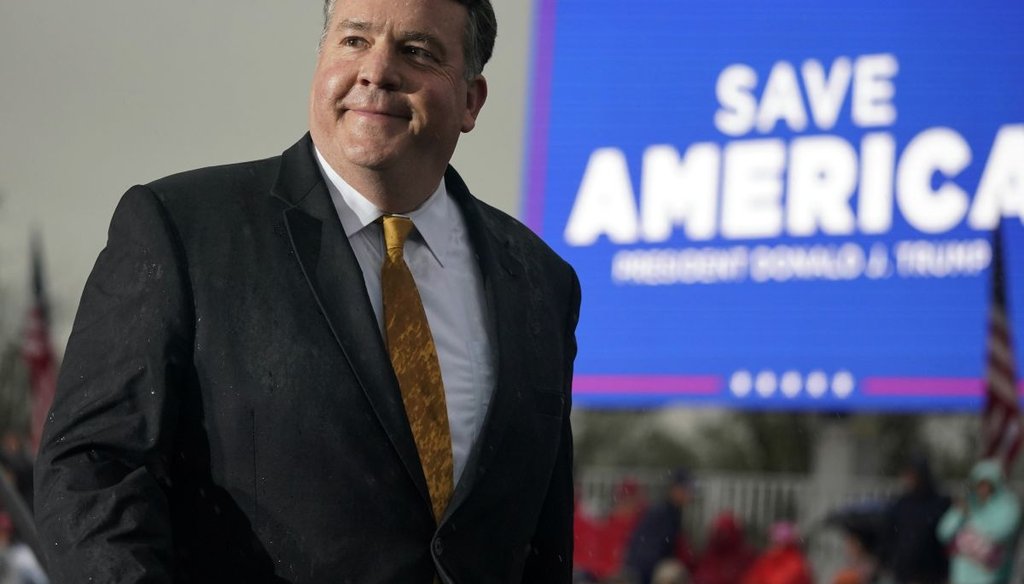Get PolitiFact in your inbox.

Rep. Alex Mooney, R-WVa., at a campaign rally in Greensburg, Pa., on May 6, 2022. (AP)
Does Gov. Jim Justice oppose the “right-to-work” policy?
If Your Time is short
-
As a candidate in 2016, Jim Justice suggested putting the state’s newly passed "right-to-work" law to a popular vote, and in 2017, he vetoed a provision that would have modified a portion of the law. At a 2021 event, Justice said he was disappointed with the law’s economic impact.
-
However, there is no evidence that Justice definitively opposes the state’s "right-to-work" law. Despite Justice being in office for almost seven years, the "right-to-work" law remains in place, and as a candidate, Justice’s campaign website does not discuss his views on it.
-
Learn more about PolitiFact’s fact-checking process and rating system.
Rep. Alex Mooney, R-W.Va., is challenging Gov. Jim Justice for the Republican nomination for a U.S. Senate race in 2024. Mooney is attacking the governor by posting a "Phony Jim Justice" website.
Mooney’s website makes a number of claims, one of which is that Justice "opposes the Right to Work."
"Right-to-work" refers to laws in 26 states that give the state government the authority "to determine whether workers can be required to join a labor union to get or keep a job," according to the National Conference of State Legislatures. Such laws generally make it hard for workers to join a union.
The Mooney website elaborated on the "right-to-work" claim by saying that Justice "threatened to veto an education reform package that would give teachers raises and put more money in the classroom all because the bill would have stopped automatically withholding union dues."
We reached out to both candidates’ offices. Justice’s campaign did not respond to inquiries, but Mooney’s campaign did.
West Virginia passed its "right-to-work" bill in 2016. The Republican legislature overrode the veto of then-Gov. Earl Ray Tomblin, a Democrat.
When Justice was running for governor as a Democrat in 2016, he proposed putting the "right-to-work" bill up for a statewide vote. But that never happened. (Justice switched his party affiliation to Republican in 2017.)
After Justice won the governorship, he vetoed a bill that was intended to modify the "right-to-work" law. Senate Bill 330 would have clarified how the bill would affect collective bargaining in the building and construction industry. Justice said the issue is one "for the Supreme Court to decide."
In 2021, Justice held a town hall meeting in which he expressed disappointment with the "right-to-work law" passed in 2016.
"Really and truly, let’s just be brutally honest," Justice said, according to West Virginia MetroNews. "We passed the right-to-work law in West Virginia. And we ran to the windows looking to see all the people that were going to come, and they didn’t come. … We’ve absolutely built the field in a lot of different places thinking build the field and they’ll come, and they didn’t come."
This suggests that Justice is not in favor of the "right-to-work" law. However, after almost seven years in office he has not acted to overturn it, and his campaign website does not mention the policy one way or the other.
Also, in 2021, Justice did sign a bill supported by "right-to-work backers" and opposed by labor unions.
That bill prohibited employers and payroll agents from withholding a portion of an employee’s pay for union political activities without the employee specifically authorizing it. It also barred state, municipal and county governments from withholding union or club dues from a public employee’s wages or salaries.
Our ruling
Mooney said, "Jim Justice opposes the right to work."
As a gubernatorial candidate in 2016, Justice suggested putting the state’s newly passed "right-to-work" law to a popular vote, and in 2017, he vetoed a provision that would have modified a portion of the law. At a 2021 event, Justice said he was disappointed with the law’s economic impact.
However, the word the Mooney campaign used was "opposes," and there is no firm evidence of this. Despite Justice being in office for almost seven years, the "right-to-work" law remains in place, and as a current U.S. Senate candidate, Justice does not discuss his views on the law on his campaign website.
We rate the statement Mostly False.
Our Sources
Alex Mooney, "Phony Jim Justice" campaign website," accessed Aug. 21, 2023.
Gov. Justice letter to President Carmichael, "Enrolled Senate Bill 330", March 28, 2017
West Virginia Legislature, "Senate Bill 330", accessed Sept. 26, 2023
Office of the Governor, "Legislature Must Focus on Budget, Not Right To Work", March 28, 2017
West Virginia Legislature, "West Virginia Code", accessed Sept. 27, 2023
National Right to Work Legal Defense Foundation, "Right to Work States", accessed Sept. 27, 2023
National Conference of State Legislatures, "Right to Work resources," accessed Oct. 21, 2023
American Legislative Exchange Council, "West Virginia Becomes the 26th Right-to-Work State," Feb. 12, 2016
Parkersburg News and Sentinel, "Gov. Justice vetoes new ‘right to work’ legislation," March 29, 2017
WV MetroNews, "Justice says right-to-work, prevailing wage fizzled - and Democrats cheer", Feb. 25, 2021
Parkersburg News and Sentinel, "West Virginia Supreme Court throws out injunction for Paycheck Protection Act," Nov. 23, 2021
Jeff Jenkins, tweet, Feb. 8, 2016
Interview with Brittany Yanick, spokesperson for Alex Mooney’s campaign, Sept. 25, 2023
Browse the Truth-O-Meter
More by Madison Ely
Does Gov. Jim Justice oppose the “right-to-work” policy?
Support independent fact-checking.
Become a member!
In a world of wild talk and fake news, help us stand up for the facts.



























